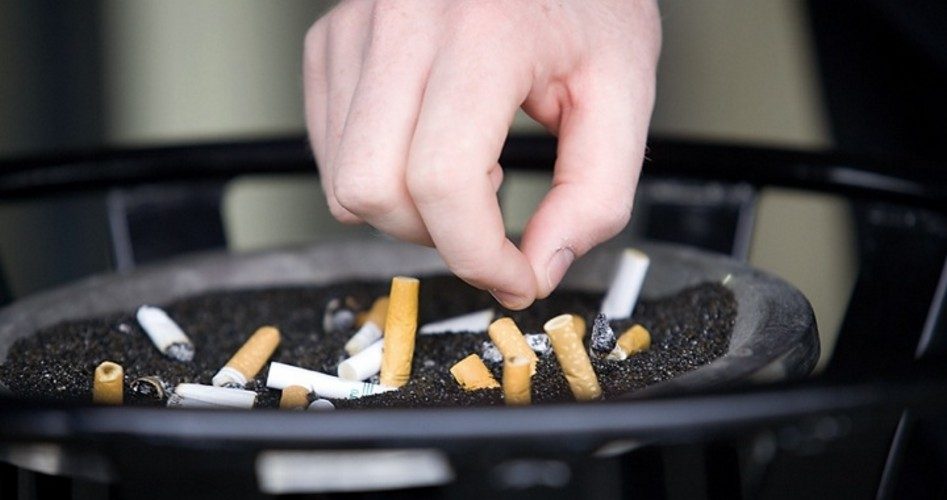
Consumers and pundits had mixed responses, as reported by California’s Fresno Bee, to Wednesday’s announcement from CVS Caremark that it would phase out sales of tobacco products by October 1. The Bee reported that CVS CEO Larry Merlo stated that the company concluded it could no longer sell cigarettes in a setting where healthcare also is being delivered.
The president and Mrs. Obama had high praise for the announcement.
NBC and the Wall Street Journal both referenced the president’s personal interest in the cigarette debate as relating not only to his own struggle to quit, but to his national agenda for the smoking public.
Said NBC,
President Obama, a former smoker who tried for years to stop, immediately praised CVS, saying in a statement that their powerful example “will help advance my Administration’s efforts to reduce tobacco-related deaths, cancer, and heart disease, as well as bring down health care costs — ultimately saving lives and protecting untold numbers of families from pain and heartbreak for years to come.
The Wall Street Journal reported,
Mr. Obama’s administration has had some success in trying to further limit smoking as well. In 2009, for instance, Mr. Obama signed a law that put the tobacco industry under the regulation of the Food and Drug Administration and, among other things, enabled the agency to ban the industry from selling candy-and fruit-flavored cigarettes. The FDA said it will later this month launch its first large-scale advertising campaign to discourage teens from smoking.
Earlier this week the Food and Drug Administration announced a $115 million dollar campaign dubbed “Real Cost,” that will use humorous ads and a few scare tactics to discourage teens from ever starting to smoke.
The Jounal added, “On other fronts, the administration hasn’t banned the sale of menthol cigarettes, which account for about $25 billion of tobacco sales in the U.S.”
Lost in all the commentary, however, is whether the president’s administration should have an agenda regarding tobacco use at all. Analysts have pointed out that no constitutional authority exists for the executive office to either promote or ban this individual behavior, or to influence a private company’s decision about the sale of tobacco. And no federal agency has the right to ban the use of products it deems “unhealthy,” or to regulate an entire industry in such a way. And neither does such an agency have the authority to spend enormous sums of taxpayer dollars on an advertising campaign toward such an end.
Given President Obama’s pen-and-phone method of rule through executive orders, however, quite a different agenda is at work.
FutureOfCapitalism.com, a website seeking to provide information and education about capitalism, posed this question about the president’s statement:
Was CVS threatened, either directly or subtly, with some more coercive government action if it failed to take this “voluntary” action? It would be easy enough for the president, in his new executive order mode, to issue an order refusing to reimburse Medicare prescriptions filled at pharmacies in retail outlets where tobacco is also sold. Don’t be surprised to see other pharamacy [sic] chains see the handwriting on the wall and follow in CVS’s footsteps.
Indeed, Walgreen’s has already announced it is considering a similar action.
As an aside, the Washington Post noted that CVS Caremark is one of 300 companies signing on to a new White House “going private” initiative to end long-term unemployment (a condition free market adherents know is best remedied by business). The Post opined that as the public is currently paying less attention to the president than is required for him to impose his agenda, he’s forced to adopt new strategies, including “going private.” “That is, extolling the virtues of business practices it likes, hoping that the public follows suit and gets Congress on board.”
This new initiative exemplifies the new strategy, and Obama is using CVS, among others, to implement it.
So what does “going private” have to do with CVS’s decision? Perhaps not much. But it does illustrate another veiled theft of American sovereignty that even the Post didn’t miss:
It’s yet another step removed from the legislative process than even “going public” was, but if it works, “going private” could be a useful tool for a president who has had an especially difficult time getting the legislative branch to consider his policies.
Will all this affect the smoking rates? Back in Fresno, the Bee noted that smokers responded, predictably, that the CVS plans wouldn’t affect their habits:
Outside the downtown store on Wednesday, ex-smoker David Piercy, 39, said removing tobacco from the stores is “going to have zero impact on who’s smoking, who isn’t smoking.”
The CVS decision is a voluntary one, but many observers note that it wouldn’t be much of a leap to expect the president to decree, by executive order if necessary, that tobacco use is one more thing under his authority if he wishes it to be. It’s been known for decades now that smoking is not a healthy habit. And perhaps CVS is making a good statement in forgoing about $2 million a year in revenues in order to back up that belief. But constitutionalists note that true liberty requires that individuals have the freedom to make even wrong choices.
It’s worth watching to see if the president “goes private,” or exercises his pen/phone plan to force other private companies to follow suit in efforts to shore up his failing healthcare plan.



